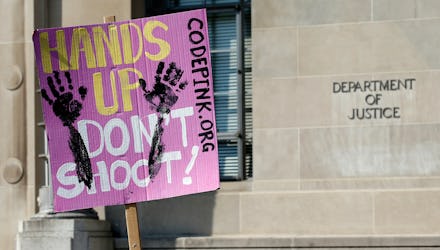One State Is Dealing With Police Brutality in a Way That Everyone Should Follow

As the recent string of police brutality incidents has continued at an alarming rate, the national conversation has turned toward finding a solution to this deadly problem.
And while options like body cameras or enacting laws to ensure the police force resembles its community have been discussed, Wisconsin recently became the first state to take a different tact.
Earlier this year, Wisconsin Gov. Scott Walker signed into law a bill that requires police to bring in outside investigators to collect and investigate relevant evidence if an officer was involved with a "loss of life."
In other words, rather than allowing police to conduct its own investigation into a officer-involved shooting or death (like in the cases of Michael Brown, Tamir Rice or Eric Garner), outside agents will collect evidence in order to find the truth.
The background: How this bill came into law is almost as interesting as the bill itself. As NPR recently reported, in 2004, a police officer in Kenosha, Wisconsin, followed 21-year-old Michael Bell Jr. after watching his driving.
Bell stopped at his house, and dash cam footage showed that when Bell got out of his vehicle, the officer confronted him. A struggle ensued off-camera, which eventually led to the officer shooting Bell point-blank in the head.
While a collection of evidence pointed toward wrongdoing by the officer, within just 48 hours the Kenosha Police Department completed an investigation that found "the shooting was justified, that the use of force was proper and that none of the officers had done anything wrong," NPR reports.
"I was just completely appalled," Michael Bell Sr., Bell's father, told NPR. Unsatisfied with the internal investigation, Bell Sr. launched his own investigation and hired an "investigative consultant who teamed up with a retired Kenosha police detective," he said.
Taking matters into their own hands: Bell's family eventually received a $1.75 million settlement stemming from a civil suit for wrongful death. They used that money to launch a grassroots campaign that took out ads in the New York Times and USA Today and eventually bought a number of Milwaukee billboards to display slogans such as "When police kill, should they judge themselves?"
Eventually, police unions took notice, and Bell Sr. worked with them to create the legislation to ensure a more thorough and fair investigation system for these types of fatal incidents.
"If you know this officer, if you've worked with him before, can you really be objective in terms of evaluating that shooting? And is it really proper for the police to be policing themselves?" Gina Barton, the Milwaukee Journal Sentinel's law enforcement investigative reporter, told NPR. "Because if you actually did do everything right, why wouldn't you want a transparent investigation that clears you and that shows everybody why you did the right thing?"
Will this help? Hopefully. Though most police forces have their own internal affairs divisions, many of them have been plagued with various problems over the years. As Barton pointed out, it can be difficult to truly hold one's coworkers to the highly objective standards required in these types of investigation.
While this kind of bill won't necessarily stop the incidents of police brutality at their source, it will hopefully increase the chances that the necessary justice is carried out and the truth is found when a police officer is involved in a civilian's death. Other states would be smart to follow Wisconsin's example and pass laws to ensure police officers are properly held accountable when someone is killed.
"I'm not against law enforcement, even though a law officer killed my son," Bell Sr. told NPR. "And I do recognize that a number of police officers risk their life to protect people. In fact, police officers need to be part of the solution."
Correction: Dec. 14, 2014